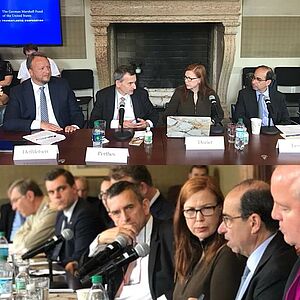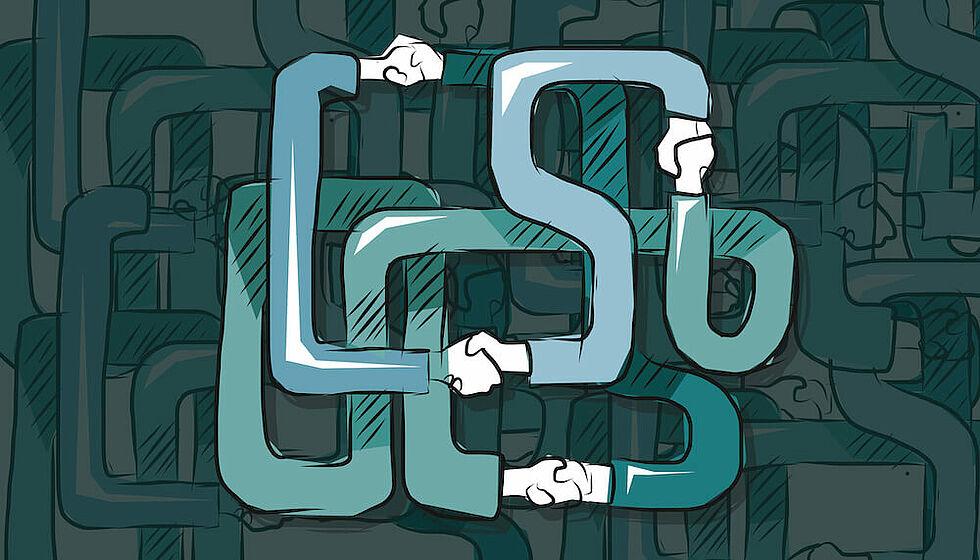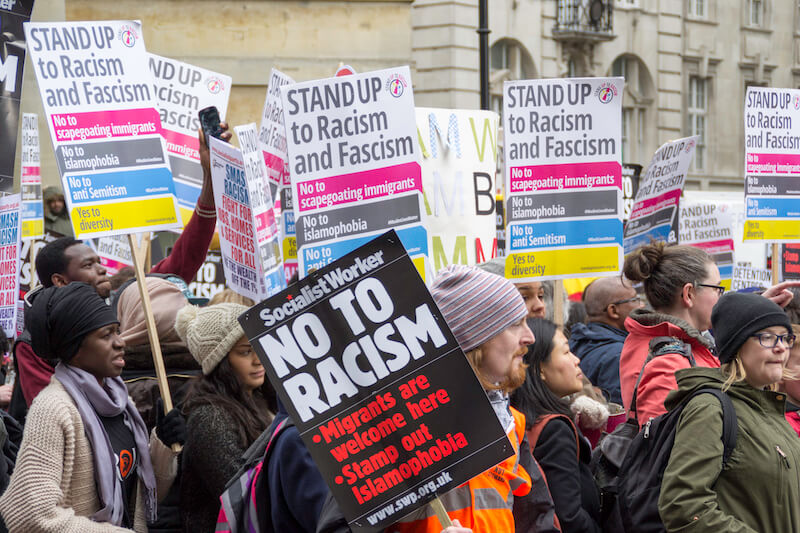Transatlantic partnership in disarray: a problem of style or substance?
The transatlantic partnership has been shaken by the latest US administration. Is it due to the White House style, or to the substance of US foreign policy? And what can be done to safeguard the partnership, which is a load-bearing component of the current world order? Experts from both sides of the pond debated the question on 8 May at the German Marshall Fund in Washington.
President Trump, the transatlantic partnership and the new world order
Two years and four months after the inauguration of the current US president, the "America First" approach has radically impacted the foreign policy of the United States, calling into question the global leadership role it has held for eight decades. Long-standing bonds of trust have been damaged to a degree that will require time, patience, and strength to repair. And this planet faces enormous climate and energy problems which can only be solved in a collaborative, cooperative, and inclusive world order. These challenges have an urgency that contemporary politics is unable and unwilling to address. How are we best to understand this new world order?
The Friedrich-Ebert-Stiftung Washington Office was pleased to present a panel discussion at the German Marshall Fund of the United States. The panel featured: Dr. Volker Perthes, Chairman of the German Institute for International and Security Affairs (Stiftung Wissenschaft und Politik); Ian Lesser, Vice President for Foreign Policy and Executive Director of the Transatlantic Center at the German Marshall Fund; and Kim Dozier, CNN Global Affairs Analyst.
As a departure point, panellists considered the world order of the past 80 years and its apparent breakdown. The United States assumed the primary leadership role in the world following World War Two, serving as a symbol and actor for a collection of values; above all, for peace and prosperity, and an economic order that did not benefit only its own interest. This leadership and order now seems unstable. Within Europe, Germany has yet to take a consistent leadership role, panellists said. And Europe -especially the European Union - must find and assert its economic and security roles in the changing world order, lest other actors fill the void.
An EU response is needed, but should it address the style or the substance of current White House foreign policy?
“Can US-European relations survive the Trump administration?”, Dozier asked. “They have to,” replied Perthes, adding that “we have to do something about it”, referring to the onus on European partners to respond.
But the question persisted of whether to put the new challenges down to this US president’s confrontational style, or to focus more on his administration’s ideological departures.
The style of the transatlantic partnership may have significantly changed, but the fundamental dynamics less so, Lesser suggested. “We are not in Europe because we’re a charity, we are there because it is in our interest,” he said. There is of course more to the relationship than this self-interest by the US, but that is an undeniable part of its geostrategic importance and historical precedent.
Perthes argued that the nature of the transatlantic relationship may indeed have changed, although its overall importance remains beyond question, and that challenges to the establish order from the Trump Administration are more than just stylistic, but also ideological. Secretary of State Mike Pompeo’s December 2018 address in Brussels, Perthes said, “declared war on what was perceived as European values, calling for exercises of national ‘sovereignty’ over Eurocrats in Brussels. That’s an ideological statement.”
This tension was a recurring theme, and could be seen to characterize the primary challenges to the transatlantic partnership since the election of Donald Trump.
“The world is changing as we disagree”
Perthes continued the discussion, asserting that “the world is changing as we disagree!” Opportunities for western allies to continue to influence and lead the world are being squandered as disagreement results in inaction. On the subject of defence and strategic autonomy, it was argued that the European pillars of NATO should be strengthened. European NATO-member countries should exercise their responsibilities in their strategic environment, not only to boost collective security but also in their own defensive self-interests.
Multilateralism and foreign policy: Opportunities taken and missed
Opportunities both taken and missed were also discussed with respect to the challenges of multilateralism in trade, China policy, and Iran policy. The collapse of the Transatlantic Trade and Investment Partnership (TTIP) negotiations, in part due to public criticism in the EU, was, as Lesser put it, “a missed opportunity” for an EU-US trade deal. But following the suspension of talks and the election of Donald Trump, the EU concluded trade agreements with Japan as well as Canada that were substantively similar, yet more readily accepted than TTIP ever was. Divergence with the US thus made convergence and agreement with other actors more palatable.
Another example of divergence with the US that had even more disappointing results was its departure from the Joint Comprehensive Plan of Action (JCPOA), a nuclear arms control and non-proliferation deal better known as the Iran Deal. The Trump administration should take note that “despite their many differences, Berlin, London, and Paris are so close on the JCPOA that you couldn’t put a sheet of paper between them.” Nonetheless, the loss of support from the United States resulted in the breakdown of the deal: Iran has suspended its compliance with parts of the JCPOA. In another missed opportunity, the US permitted the deal to effectively collapse, something which will not be simply reconstructed or reset with a new administration.
Working around the current White House
Looking forwards, climate change was cited as a policy area dependent on multilateral action that could be reinvigorated as soon as a new US administration is in place: the Paris Climate Agreement, unlike the JCPOA, can be reset. And, as Perthes noted, it is also possible to act multilaterally below national level: State-level cooperation is already taking place on climate policy. One need only look at California and the 23 other states in the United States Climate Alliance acting to reduce greenhouse gas emissions in accordance with Paris Agreement guidelines and goals. The US side of the transatlantic partnership is more than the Trump administration; it is the states, it is Congress, and it is also the American people.
###
Lauren Schwartz is program and communications officer at FES in Washington DC. For more information on the work by FES in the US, contact the FES office in Washington DC and follow their Facebook page for daily updates.










